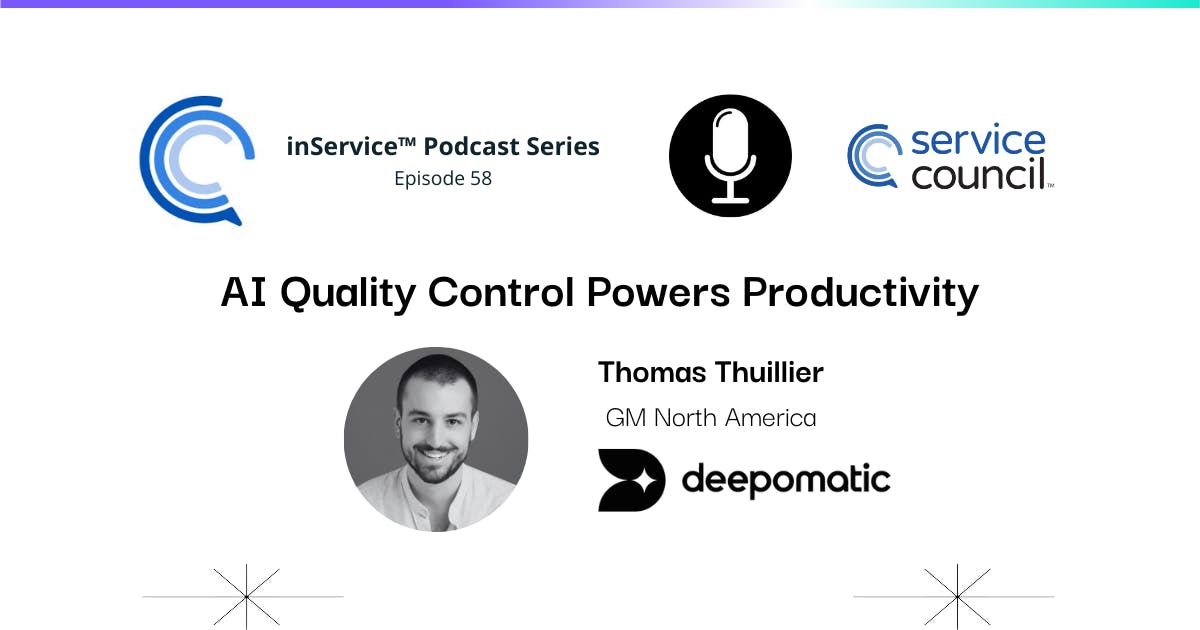In a dynamic podcast discussion titled "AI Quality Control Powers Productivity," our General Manager North America, Thomas Thuillier, and John Carroll, CEO of the Service Council, delved into the pivotal role of AI in elevating service quality and bolstering productivity within field service businesses. If you’ve missed the live podcast, no worries, you will find a summary of the main talking points and an access to the replay in this article.

Understanding Quality in Service Operations
Quality in the service sector embodies multifaceted dimensions, ranging from the accurate execution of tasks during the initial visit to the sustained excellence of service over time. Additionally, it encompasses delivering a seamless customer experience. However, achieving consistent quality becomes a formidable challenge amidst the intricacies of service networks involving various operators, subcontractors, and independent contractors.
Quantifying the Cost of Poor Quality
Poor quality not only incurs the direct expense of repeat visits, adversely impacting productivity, but also leads to revenue loss due to service disruptions. Furthermore, it triggers additional expenses such as customer service inquiries and eventual customer attrition.
These costs are not trivial; according to the Service Council's findings, a repeat visit can amount between $250 to $2500, depending on its complexity and duration. Additionally, when quality standards are not completely met during field service operations and do not get fixed, it creates what is called a “technical debt”, that will very likely be very disruptive for companies in the long term and cause very expensive repair.
Empowering Quality Management with AI Metrics
Deepomatic's collaboration with an ISP in France illustrates the transformative potential of AI in quality management. By harnessing AI for automated quality checks, the ISP gained comprehensive insights into the compliance of installations with different view parameters (per geography, per subcontractor, per task, etc.). This data-driven approach empowered project managers to make informed decisions and present actionable insights to executives, thereby enhancing operational efficiency. Notably, AI enabled the gathering of quality metrics from 100% of operations, a significant improvement over the previous manual process which captured only a fraction of the data (8 to 10%).
Progressing AI Adoption and Enhancing Technician Experience
While AI adoption varies across different use cases, its potential to augment human capabilities remains profound. According to the 2023 Voice of the Field Service Engineer Report carried out by the Service Council, technicians acknowledge the increasing complexity of their roles, with 88% indicating that repairing break-fix issues is a primary aspect of their work. Moreover, 86% believe that their work requires greater technological support. However, user adoption remains a challenge, with 81% of agents still resorting to phone calls to address issues in the field rather than leveraging available technologies.
To overcome this challenge, it is imperative to involve frontline workers in the innovation process actively. Unfortunately, only 41% of field service engineers feel they have a role in innovation, highlighting a gap in communication between management and frontline workers. By bridging this gap and ensuring a seamless user experience, companies can foster greater adoption of AI technologies among field engineers.
Realizing Value through AI Integration
The first value proposition revolves around minimizing repeat visits by mitigating errors during field operations. In the Total Economic Impact™ of Deepomatic, an assessment conducted by the third-party analyst Forrester, it was revealed that four of our clients experienced a notable reduction of at least 50% in their repeat visit rates upon implementing our Visual AI platform.
Beyond mitigating the costs of repeat visits, AI offers significant value in automating quality control processes. When companies run hundreds of thousands or millions of operations every year and require technicians to capture 5 to 10 photos per installation, automation is critical, otherwise they would require an infinite pair of eyes to check what’s being done in the field. Therefore, by reducing the need for manual validation, AI streamlines operations and optimizes resource allocation.

The integration of AI into service operations represents a transformative opportunity for businesses to enhance quality, productivity, and customer satisfaction. By leveraging AI-driven insights, companies can mitigate the costs of poor quality, optimize resource allocation, and empower frontline workers to deliver exceptional service.






